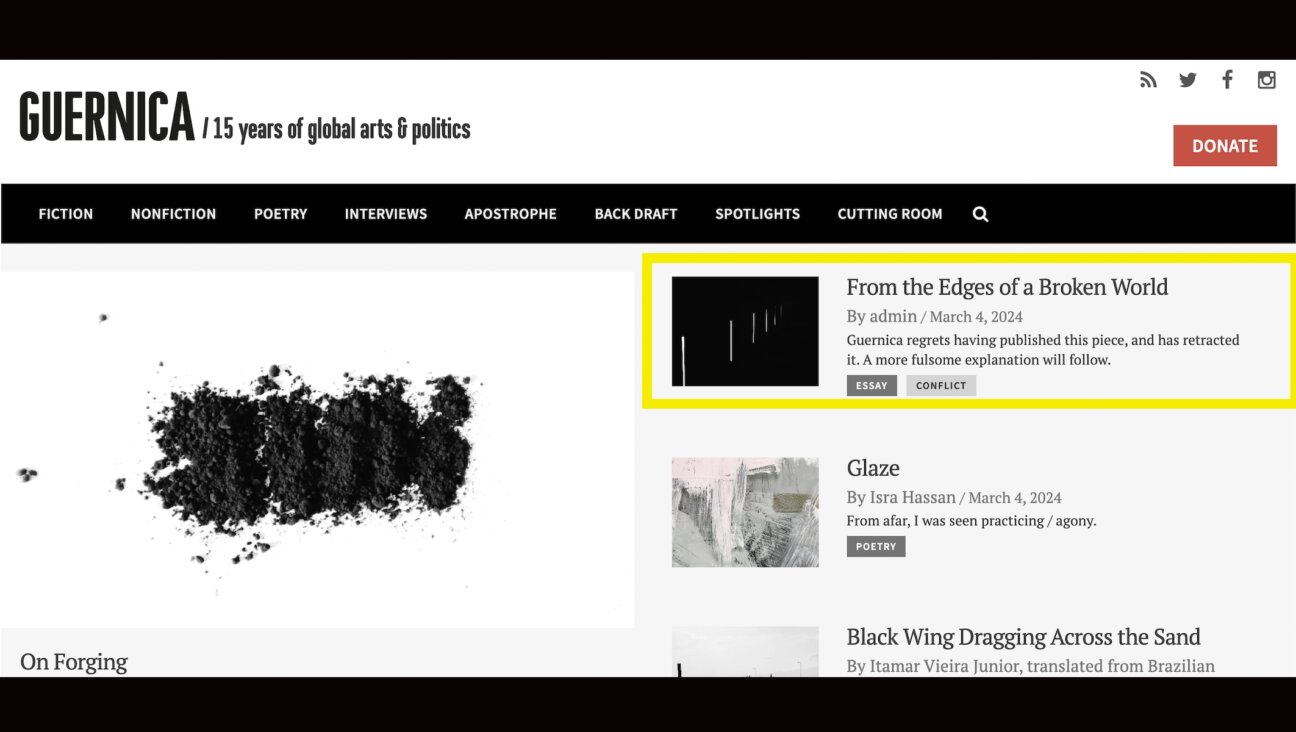To Bug and Be Bugged
Annoyance and botheration are never as well expressed as in Yiddish. Here are a few useful idioms.
HAK MEER NISHT KA’ TSHAYnik
Don’t knock me a tea kettle [i.e., stop rattling on like a kettle that’s boiling dry].
VOOS DRIKstee MEER A KRIZH FIN DAIM?
Why are you pressing me in the small of the back about it? Why are you breaking my back (or balls) about the topic in question?
ZEE ZITST MEER AFN KArek
She’s sitting on my neck; she’s a bother or burden to me.
ZEE SHTAYT MEER EEbern KArek
She’s pressing me, riding me.
ER KRIKHT Alemen IN DEE OYGN
He crawls into everyone’s eyes [ i.e., he’s always “on” (and is thus a complete pain in the neck)].
PROTECTIVE PHRASES
If a particularly loathsome or disastrous state of affairs is invoked — your fourteen-year-old daughter starts a sentence with, “And after my first tattoo,” or you’re offered a job at a kosher meat-processing plant in Iowa — you immediately interrupt with what can only be described as a futile attempt to unspeak the words just spoken:
BEIS DEER OOP DEE TSING
Bite your tongue.
As if biting it off would be better than letting it give voice — and hence reality — to so horrible a thought. This is an everyday sort of phrase, part of the arsenal of small arms used by Yiddish in its unceasing fight against everything around it.
“Bite your tongue” is a response to an unpleasant possibility that has been raised by someone who should know better. Sometimes, though, circumstances leave people no choice but to refer to past calamities, present predicaments or future misfortunes, some of which are inevitable (the eventual death of anyone now living, for instance), and some, with God’s help, which might be avoided. You can mention as many such things as you like, as long as they are preceded or followed by any one of a number of protective phrases designed to prevent such disasters from occurring. Among the most often-used in both Yiddish itself and Jewish English are the members of the closely related series:
khoLIleh
KHAS ve-SHOOLEM
KHAS ve-khoLIleh
and the same thing backwards:
khoLIleh ve-KHAS
all of which mean “God forbid, heaven forfend,” though the forms with khas are stronger than a simple kholileh. Kholileh on its own goes back to the Bible; khas ve-shoolem is found in the Talmud.
SEH KEN khoLIleh TREFN AN IMglik
An accident could God forbid happen.
KHAS veh-SHOOlem IKH ZOL A MOOL ESN KHAzer
God forbid I should ever eat pork.
“God forbid” can be omitted in the English sentences without any loss of clarity. To leave it out of the Yiddish is to show that you’re not only heartless, but don’t speak Yiddish very well, either. Indeed, its absence would imply that you wanted these events to take place. Once the idea has been invoked, that kholileh is all that stands between you and disaster.
Kholileh has pretty much the same meaning as the more literal
GOT ZOL OOPhitn
God forbid [more literally, may God guard against].
It usually precedes or follows the events that it’s modifying; it can’t be dropped into the middle of a clause like kholileh and its cousins.
Unlike other such expressions, both got zol oophitn and the kholileh series are regularly used ironically:
GOT ZOL OOP-hitn, DER TAKHshit ZOL ZIKHN FAR ZAKH A DZHOB
God forbid, the *takhshit should look for a job [the “real” Yiddish for dzhob here is SHTAIleh].*
khoLIleh IKH ZOL SHEPN A BISL NAkhes FIN MEIneh KINder
God forbid I should get any joy from my children.
There’s also the highly popular
SEH KEN khoLIleh NISHT SHATN
It can’t, God forbid, hurt,
which means that it can do a great deal of good:
Them: It occurred to me that if I want to look like Arnold Schwarzenegger, I should maybe lift some weights.
You: SEH KEN khoLIleh NISHT SHATN,
that is, lifting weights will certainly not prevent you from looking like Arnold Schwarzenegger.
Though rarely used ironically, the “may it not be mentioned” series of preventive phrases are far from rarely used. They are just as colloquial as any of the phrases mentioned above and are used almost interchangeably with them. “May it not be mentioned” really means “May it not happen,” and has been translated accordingly:
NISHT FAR EIKH geDAKHT
May it not happen to you.
NISHT DOO geDAKHT
May it not happen here.
NISHT FAR KEN YEEDN geDAKHT
May it not happen to any Jew.
While nisht far ken yeedn gedakht usually means “it shouldn’t happen to anybody,” it’s sometimes used of circumstances that are disastrous only if you happen to be Jewish:
DEE rehstoRAnen DORTN ZEnen Aleh KOOshereh, NISHT FAR KEN YEEDN geDAKHT
The restaurants there are all kosher, may such a thing not befall any Jew.
We need to guard against more than just calamity, though. There are demons all round us who exist solely to turn good fortune to bad, success into failure, beauty into ugliness. They are helped by invidious people who can’t stand to see anyone outstrip them in any way; helped, that is, by everybody. Human malice and resentment can cast an EIyin HOreh, a bayz oyg, an evil eye, onto the object of envy — often without any conscious intent on the part of the perpetrator. According to the Talmud, a human being envies everybody except for his children and his students — and we’re not always sure about them. For the rest, Jewish tradition tends toward unblinkered acceptance of the fact that deep down, where we think that no one can divine our secret thoughts, 99.9 percent of us have no more regard for others than the average stoat does:
boDEI ZAKH AYN OYG, aBEE YAInem TSVAY
I’d gladly lose one eye, just as long as you lose two.
Yiddish knows how to deal with such eye-gougers. In his 1928 dictionary, Alexander Harkavy defines farGINen as “not to begrudge, not to envy, to wish well.” A verb of the sort that makes Yiddish Yiddish (even if it does appear in German as vergönnen), farginen is rarely used seriously on its own except as a reflexive, farginen zakh, which means “to allow oneself, to indulge in”:
KHOTSH IKH BIN AF A STHRENger dee-Eteh, farGIN IKH ZAKH A SHAKL YAIDN IN-DER-FREE
Although I’m on a strict diet, I allow myself a shot of whiskey every morning.
Otherwise, we’re dealing with a strictly negative concept — really a double negative concept:
MEH KEN MIKH NISHT farGInen MEIN SHAYNKEIT
They cannot not begrudge me my beauty [i.e., they hold my beauty against me].
The positive form of the verb isn’t all that common, and is usually used ironically:
IKH farGIN IHM ZEIN SAYKHL
I don’t begrudge him/don’t envy him his brains
means that you don’t think he has many brains at all.
Michael Wex is the author of “Just Say Nu: Yiddish for Every Occasion” from which this text is adapted; “Born To Kvetch,” and “The Adventures of Micah Mushmelon, Boy Talmudist.” He blogs at www.michaelwex.com.

I hope you appreciated this article. Before you go, I’d like to ask you to please support the Forward’s award-winning journalism this Passover.
In this age of misinformation, our work is needed like never before. We report on the news that matters most to American Jews, driven by truth, not ideology.
At a time when newsrooms are closing or cutting back, the Forward has removed its paywall. That means for the first time in our 126-year history, Forward journalism is free to everyone, everywhere. With an ongoing war, rising antisemitism, and a flood of disinformation that may affect the upcoming election, we believe that free and open access to Jewish journalism is imperative.
Readers like you make it all possible. Right now, we’re in the middle of our Passover Pledge Drive and we need 500 people to step up and make a gift to sustain our trustworthy, independent journalism.
Make a gift of any size and become a Forward member today. You’ll support our mission to tell the American Jewish story fully and fairly.
— Rachel Fishman Feddersen, Publisher and CEO
Join our mission to tell the Jewish story fully and fairly.
Our Goal: 500 gifts during our Passover Pledge Drive!
























